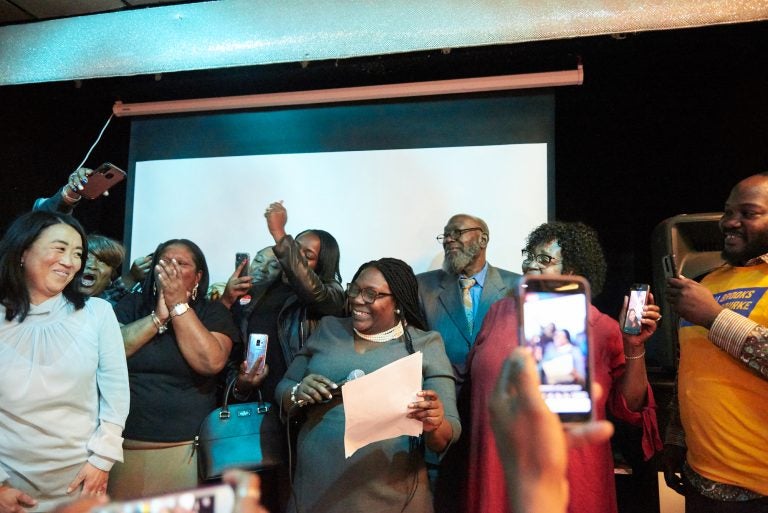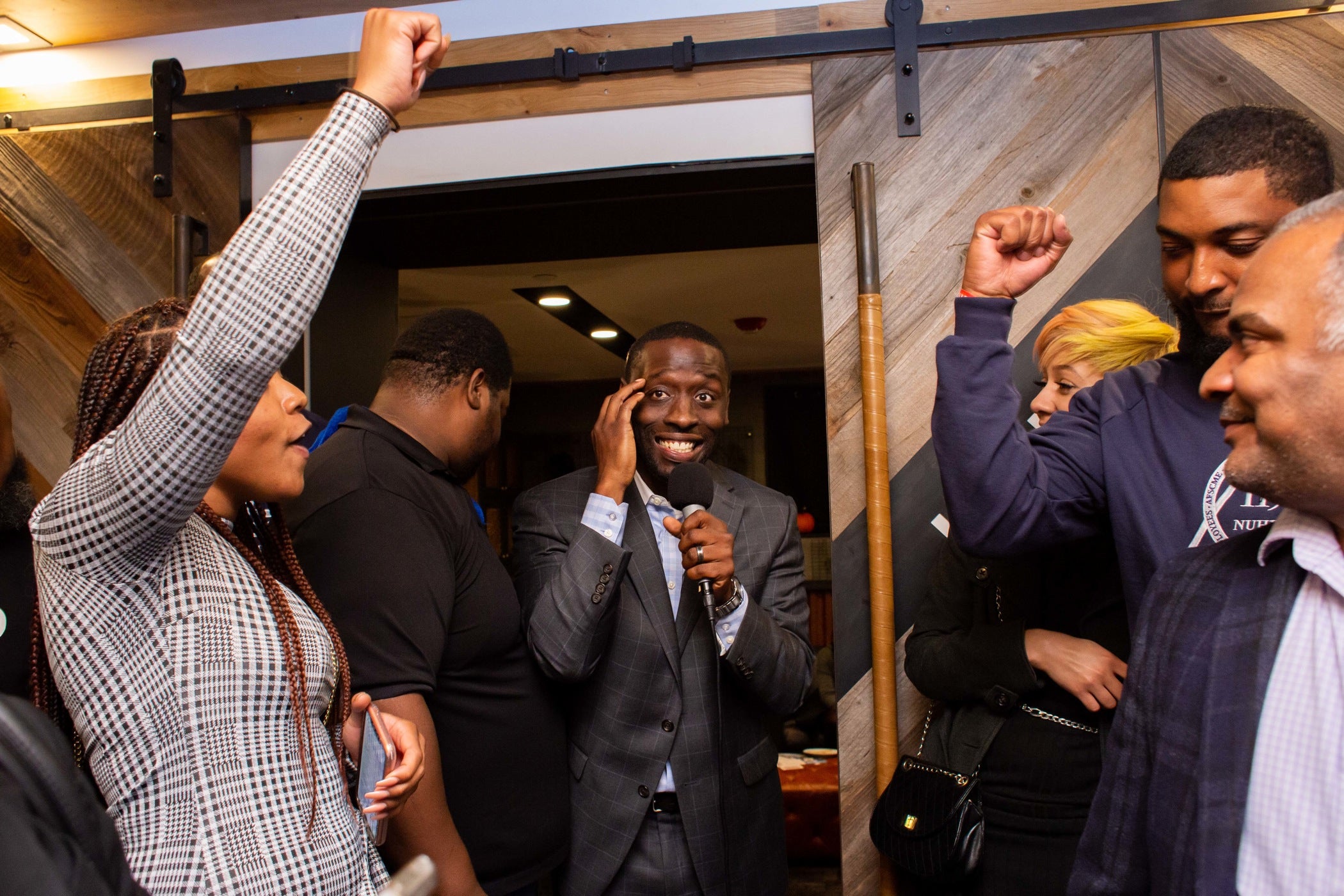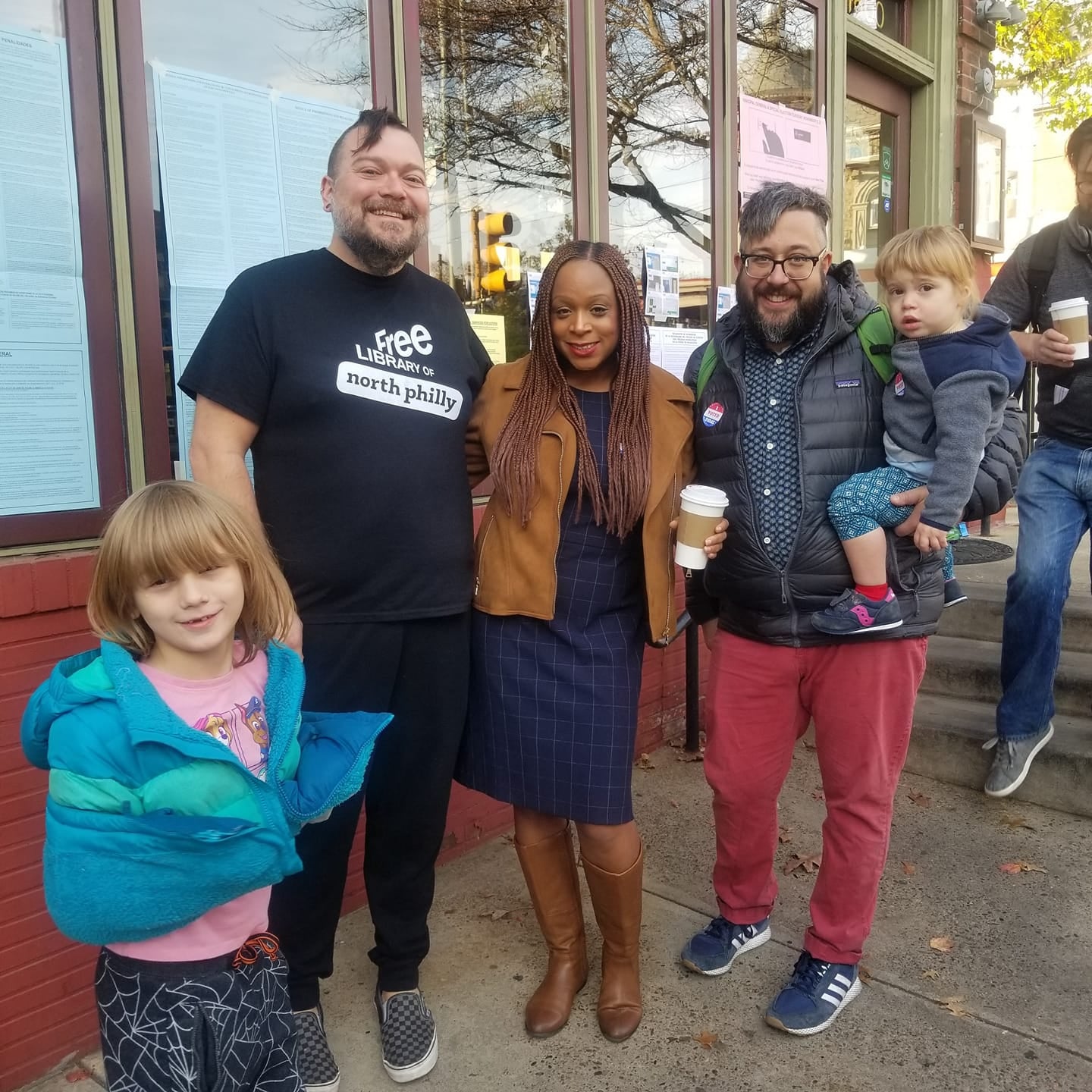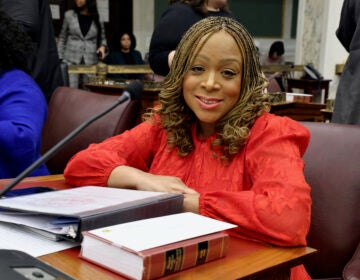Rent control, ending Philly’s 10-year tax abatement: Welcome to City Council 2020
City Council wields significant power over zoning and land use decisions. With new members joining the legislative body, Philly’s development climate is likely to shift.

Kendra Brooks at her victory party in North Philadelphia. (Natalie Piserchio for WHYY)
The ground rules of Philly’s development game are changing.
Working Families Party candidate Kendra Brooks’ unprecedented Election Day win brings an unabashedly left-wing perspective to the fights over zoning, land use and real estate development that are City Council’s bread and butter.
Brooks, a public education activist from Nicetown, won on a campaign platform that resonated with voters concerned about affordability, schools and economic mobility in a city whose poverty ranking remains stagnant even as some neighborhoods attract more affluent residents.
She promised to bring a radically different perspective to City Council and improve public services, from the city’s unequal parks system to SEPTA. Brooks says she wants to push the public transit authority to eliminate fares for children and end transfer fees.
“For us to be the poorest big city in America — a large portion of our citizens are using public transportation as a means to work, as well as engage their families — we need to find a way to make it more affordable,” Brooks said in September.
Brooks’ victory provides another vote for radically restructuring, if not eliminating, the 10-year property tax abatement. She frequently talked about ending the development subsidy during her campaign.
The incentive is controversial, with many neighborhood groups and education activists decrying it as a policy that deepens inequity in the city. Defenders say that it is needed to counterbalance the high costs of construction in Philadelphia and see it is a job creator.
Brooks also supports rent control, a policy that hasn’t gained much traction in City Hall in the past.
During her campaign, Brooks relayed her personal story of getting laid off from her job of 17 years and losing her home to foreclosure. She says she now rents the place that she used to own, and plans to use her seat of power to fight for more affordable housing in the city.
“I will go in pushing to make housing a central tenet of everything City Council does over the next four years,” wrote Brooks in response to a survey by left-wing group Reclaim, “bringing those with lived experience into the room and always making people, not developer profits, the center of our work.”
Beyond Brooks, Election Day’s results will mean new dynamics for Philadelphia neighborhoods.
Philly is a strong mayor town, and much of City Council’s actual power comes down to brick-and-mortar issues of city governance: zoning maps, streets rules, land sales and development policies.
“Almost a fourth of the body will be new,” said Mustafa Rashed, a political consultant and City Hall lobbyist. “That’s a significant amount of new ideas, new opinions, new agendas.”
The body can also steer the agenda when enterprising members champion a cause, like Maria Quiñones-Sánchez’s inclusionary zoning bill, or Helen Gym’s right-to-counsel legislation. And there will be opportunities to stand out in the year ahead, on issues like rent stabilization and the 10-year property tax abatement.
Two new Democratic members
Two new Democratic at-large members will also be joining City Council’s ranks. Neither has expressed a particular interest in land use, development or housing issues, although Isaiah Thomas told WHYY last spring that he supports rent stabilization policies.
He said that he envisioned potentially creating rate increase caps in particular areas “to allow people and neighborhoods to adjust to market changes.”

As outgoing Councilmember Blondell Reynolds Brown’s former chief of staff, Katherine Gilmore Richardson has experience working on zoning bonuses (including an incentive to encourage green roofs).
Both Thomas and Gilmore-Richardson have strong relationships with Darrell Clarke and are expected to support his bid to remain City Council President. It remains unclear how they will vote on issues the Council President favors, such as increasing parking minimums.
Change in West Philadelphia
The 45-year reign of the Blackwell family will end in 2019, starting West Philadelphia on a new path in 2020. The incoming Councilmember, Jamie Gauthier, beat Jannie Blackwell in a surprise victory in the Democratic Primary. She faced no Republican or third-party challenger in Tuesday’s general election.
City Hall observers expect Gauthier to take a radically different approach than her predecessor.
Blackwell made her name on constituent services and maintained a reputation for trying to help the vulnerable constituents who came to her office seeking aid. But her legislative track record was extremely erratic. (Remember the failed bid to ban sidewalk planters?)
Blackwell, who assumed power after her husband, Lucien Blackwell, vacated the seat to run for Congress in 1991, fielded criticism for failing to take a systemic approach to the district’s evolving development needs. She only remapped a few corners of her West Philadelphia district after the city’s 2012 zoning overhaul. The strategy occasionally angered neighborhood groups who felt that the outdated zoning allowed developers to slip unwanted developments into their communities.

Gauthier comes from a different background. The West Philadelphia-raised, University of Pennsylvania-educated urban planner doesn’t have the long history with the city’s Democratic Party, although her sister does work for Councilmember Curtis Jones. Her career includes stints as the executive director of the Sustainable Business Network and as a program officer at Philadelphia Local Initiative Support Coalition, a major funder of affordable housing and economic development projects. Most recently, she served as the executive director of the Fairmount Park Conservancy, a private organization that supports the city’s park system.
“I think any time you see someone with a degree in city planning get elected to city government, you can expect a very thoughtful perspective on land use issues,” said John Hawkins, a lobbyist who represents the development industry.
Gauthier said she plans to focus on updating her district’s zoning maps immediately. She will also be adding a city planner to her staff under the title of “director of equitable development.” Their charge? To help constituents participate in the remapping process and negotiate with developers, the incoming Councilperson said.
“Their job will really be to ensure that they have more inclusive development happening in the district,” said Gauthier. “We want to stop people from getting displaced due to development. We want to ensure we still have affordability and a sense of community in the district.”
The other major difference with Gauthier will be in the future of public land sales in the district. Blackwell did not move publicly held land in her district into the Philadelphia Land Bank, frustrating many affordable housing groups.
“We think that the change in West Philly is positive for groups thinking about long-term affordability,” said Nora Lichtash, head of the Women’s Community Revitalization Project, a Philadelphia nonprofit working to develop permanently affordable community land trusts.
Councilmembers tend to prioritize specific issues when it comes to how they vote on public land use decisions. Council President Clarke, for example, says he tries to encourage minority-owned development companies. Gauthier says her primary focus will be affordable housing.
“As we are having these discussions about affordability and rising rents, vacant land is a huge opportunity to address some of those issues,” said Gauthier.
The Republican Tango
Brooks’ unprecedented win cost Philadelphia’s Republican Party one at-large seat, but that likely won’t change much in City Hall.
Tenth District incumbent Republican Brian O’Neill is known for exercising strict control over development and land use in his district, and he prides himself on his knowledge of the zoning code. He agrees with Clarke’s critiques of the city’s zoning regime — it doesn’t require enough parking and is generally too permissive.
However, with half of this Council session already over, the Zoning Code Review Commission that he introduced with Clarke still does not have any appointees. Their influence will be further diluted by the loss of Blackwell and retiring Councilmember Bill Greenlee, who were reliable votes on suburban-style zoning moves. At-large Councilmember David Oh, who declared victory early Wednesday morning after a close race, will also have a vote to offer.
“The problem is when you are a Republican, and you are the minority party, there’s not much you can do,” said Larry Ceisler, a longtime political observer and lobbyist. “You will not see a lot of legislation from a Republican. They are just a vote.”
WHYY is your source for fact-based, in-depth journalism and information. As a nonprofit organization, we rely on financial support from readers like you. Please give today.







